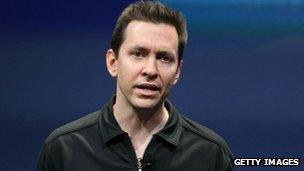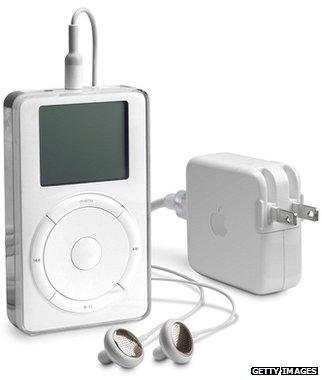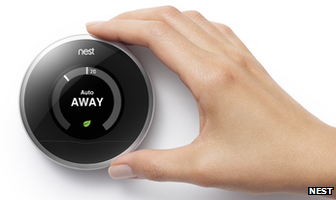Tony Fadell: From iPod father to thermostat start-up
- Published
The BBC's Leo Kelion talks to Tony Fadell about the iPod and his latest venture Nest
Tony Fadell is one of Silicon Valley's biggest names. He's known as the "father of the iPod" for his work on the first 18 generations of Apple's music player and was also involved in the hardware design of the original iPhone.
Since cutting ties with the firm in 2010 he's set up Nest - a smart-thermostat that looks like nothing else on the market.
But let's put his achievements aside for a moment and pinch-and-zoom into the ousting of a man portrayed as his nemesis: Scott Forstall.
In 2011 Businessweek magazine, external ran an article which said the two men had repeatedly clashed at Apple with Mr Forstall - the iPhone software chief - raiding his colleague's team for talent, creating an "explosive" climate in which the two argued over credit, attention and resources before Mr Fadell ultimately quit.

Scott Forstall lost his post as Apple's iOS software chief in October
So what does he make of the news that Mr Forstall lost his post in October after reports of rifts with other executives and a refusal to apologise for the release of a flawed Maps app.
"Scott got what he deserved," Mr Fadell told the BBC.
When pressed, he adds: "I think what happened just a few weeks back was deserved and justified and it happened."
So where does that leave Apple and the shares he still holds in it?
"If you read some of the reports, people were cheering in Cupertino when that event happened," he answers, referring to Apple headquarters in California.
"So, I think Apple is in a great space, it has great products and there are amazing people at the company, and those people actually have a chance to have a firm footing now and continue the legacy Steve [Jobs] left."
Leadership rumours
One Wall Street analyst found these comments telling, bearing in mind both Mr Fadell and Mr Forstall had once been tipped as successors to Steve Jobs.
"If you are the head of a major success, which both of these people were, of course you would be considered as a candidate to lead the company," says Colin Gillis, senior technology analyst at BGC Partners.
"The reality is in any organisation there is more disruption and tension than people realise from a distance and it's coming out more clearly now after the departure of Forstall.
"For an investor this is an important kind of thing to watch out for. There have been important changes of leadership and tone at Apple... Jobs, Forstall and Fadell were behind its most disruptive recent products, but [industrial design boss] Jony Ive is still there, and he's the one investors are now watching."
Apple said Mr Forstall - who remains its "special advisor" until next year - was not available for comment.
Working for Jobs
Mr Fadell himself says the decision to shift part of Mr Forstall's responsibilities to Mr Ive means that Apple's software design is now in "good hands".
And he has even warmer words for his ex-boss, describing his nine years working with Mr Jobs as one of the most important relationships of his life. He adds that the experience taught him a lesson that he has tried to put into practice at Nest: success is about much more than a good product.
"It's about every touchpoint where the consumer interacts with the brand," he explains.

The original iPod featured a small hard disk and rotating wheel, and was only compatible with Mac computers
"Whether that's at learning about the product, buying the product, using it, servicing it, unboxing the product - all of those places are consumer touchpoints and you need to look at those in as much detail as you do the product-user interactions."
Mr Fadell says it was true that Mr Job's high standards meant no-one at Apple could ever relax around him, but he was happy to bust some myths.
He says the idea of the iPhone having a click-wheel to make calls was "never going to really happen". Although the idea was briefly explored, he says it was obvious within a couple of months that a touchscreen was the better option.
And he laughs when asked about the much-repeated story that Mr Jobs dropped a prototype iPod into water, saw bubbles come out and said it proved the device could be shrunk further.
"It's so funny," Mr Fadell says.
"That story is about Sony products back in the 70s and the 80s. That was actually the Sony CEO at the time doing those things, not Steve."
Smart heating
There was a lot of speculation about what Mr Fadell would do after leaving Apple. No-one guessed he would release a thermostat.
He describes himself as having "stumbled" on the idea after exploring eco-friendly products and discovering such devices controlled half or more of the average home's energy bill.
His device, Nest, features a crisp, minimalist graphical readout surrounded by a metallic band and aims to "learn" how to save energy by studying owners' habits. Perhaps unsurprisingly it can be adjusted remotely by a smartphone app.
It went on sale in the US and Canada last year. Teething problems followed.

Nest is controlled by rotating its bezel to adjust the temperature
Manufacturing costs proved too high and about 25% of homes found their boilers and/or air conditioner systems proved incompatible. Mr Fadell says both issues have since been resolved.
He says his current focus is to launch Nest in 63 countries, including the UK, but proves reticent about speculating what he might develop next.
More connected household devices would be an obvious bet, but he mocks the idea of an internet-linked kettle or toaster, saying he can't see the point.
Kicking crowdfunding
Mr Fadell becomes more revealing when asked about other tech innovations trying to get off the ground, with some critical words for big projects that rely on Kickstarter or other crowdfunding sites.
"For the public to think that these products - once they have an interesting CAD [computer-aided design] rendering and maybe an interesting video that they quickly cooked up - that these products will actually see the light of day any time soon - I think that's a disservice to how hard it is to make the kinds of things that make a difference," he says.
"Anyone can make a housewares item that has no electronics in it, but something that is truly intricate and with lots of digital hardware and software and customer service and support, it is very difficult to pull off a business like that."

Mr Fadell believes Nest fulfils a desire for devices to connect to smartphone apps
He adds that he has helped fund about half a dozen small projects, including a cardboard robot and a movie - but urges entrepreneurs with more ambitious ideas to realise the benefit of giving up a stake in their business to bring venture capitalists or private equity firms on board.
"[It] allows small teams to go through the real financing and real management routes that are imposed through private investment," he adds.
Before he leaves there's just time for one more question. Having developed a click wheel for Apple and more recently a rotating bezel to control Nest, is he sad to see such an interface ditched from recent iPods in favour of touchscreens?
He stumbles for a second and then says: "You kind of fall in love with certain things over time. But you can see how other substitutes work as well or even better.
"Do I have melancholy for that? Absolutely. But do I miss it - not really."
- Published30 October 2012
- Published28 September 2012
- Published25 October 2011